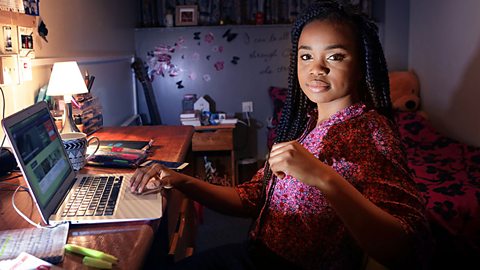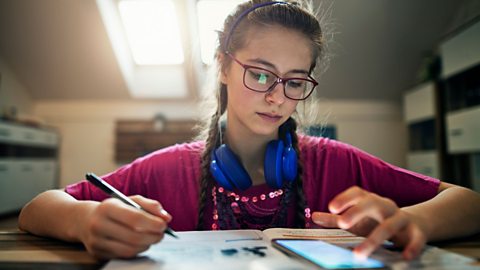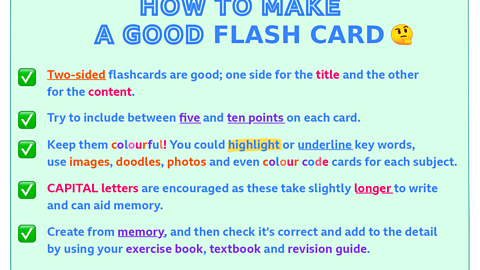We all know how to use flashcards properly, right? WRONG! It turns out many of us may have been using flashcards incorrectly all along – oops…
To find out where you might be going wrong, watch this short video from learning scientist Dr Carolina Kuepper-Tetzel and then scroll down for some more tips on how you can study smarter using a little trick we like to call retrieval practice.
Testimony: Hi, My name is Testimony and throughout school, I've always found it hard to remember the certain facts and figures that we covered in class. So today I'm going to be speaking to learning scientist Dr Carolina, to see if she can help me with some tips. Hi, Carolina. Hello and nice to meet you. I was hoping you can give me some advice on how to remember the things that we covered in class.
Carolina: Yes. So in cognitive psychology, we have excellent strategies, one of them is retrieval practice. The only thing you have to do is retrieve information from memory without looking at your notes. And that process that you engage in when you bring it to mind, that boosts your learning and helps you remember new information in the long term.
Testimony: So, practising the memory makes it stronger?
Carolina: That's exactly right.
Testimony: Wait so, how do I do that?
Carolina: You can use it quite flexibly. You can do a brain dump, put everything down on paper that you can remember. You can explain it to someone else as well. So to a friend, you can meet as a group and do that. You can just do it in your own head for example, and just without saying it out loud. The important thing is that you make sure that you answer how and why questions in the process, so you want to make sure that you really obtain a deeper understanding of the material.
Testimony: What about flashcards? How do I use them correctly?
Carolina: There are different ways on how you can use flashcards. And when you observe students, what they would do is, they will write a whole bunch of information on the flashcard and then read the flashcard over and over. However, that’s not the best way to use a flashcard. It's better to use it by retrieving information from memory, so recalling that information. So you would have some cues on one side or some questions on one side and that you use to prompt your memory and recall information from memory first, and then you flip the card for feedback only.
Testimony: Thank you for taking the time to speak to me, Dr Carolina.
Carolina: Thank you very much.


What is retrieval practice?
Retrieval practice is the process of regularly retrieving knowledge from memory – so basically testing yourself. A lot of people think that just reading and rereading textbooks, notes or flashcards will help them to remember the material, but it's the act of recalling from memory that really helps make things stick. So, instead of just rereading textbook chapters, notes or material the teacher has handed out, try to recall the material from memory first. You can do this by making notes based on what you remember, then checking these against the original material to see if you remembered it correctly. You do this again and again until you're getting it right every time. This takes more effort than just rereading, but it's exactly this effort that makes it a more effective way to learn in the long run.

How to use flashcards
Flashcards are a popular way to use retrieval practice, but if you're just reading your flashcards over and over again, you're not getting the best use out of them. But don't worry – we've got some tips to help you get back on flash-track!
- Good flashcards will have a couple of keywords or a question on one side and then the answer or explanation on the other.
- The best way to use flashcards is to test yourself! Use the keywords or question on the first side to prompt you, then try recalling from memory what's on the other side. You can write down what you've recalled or just do it in your head.
- Many of us make the mistake of flipping the flashcard too soon, but you really want to try to recall what's on the flashcard from memory first before you flip the card to see the answer.
- If what you've recalled from memory is wrong or incomplete, don't worry. This exercise is all about showing you what you don't yet remember so you can work on getting it right next time. Take some time to read the correct information, then try again. Repeat this until you get it spot on every time!
- If you have difficulties reading or writing flashcards then you could try using voice notes, speech-to-text or flashcard apps on your phone or computer.
1 of 3
Another way to use retrieval practice
One of the main benefits of retrieval practice is you don't need to wait until you're sitting at a desk to put it into use. You can recall taught material wherever you are and the easiest way to do this is called self-explanation – pretty self-explanatory right?
To self-explain effectively, you should pick some concepts you were taught in class and explain them to yourself in your mind, to a peer, or by writing them down. This will really help strengthen your knowledge, but remember to double-check your textbook afterwards to make sure the information you've recalled really was accurate! If not, don't worry. Read your notes or textbook again, then put them away and try to recall them from memory again. Rinse, repeat and keep going! You've got this.

So now you've mastered a couple of effective study techniques to help with your schoolwork, you can combine these with other techniques from the pages below to help you on your way to becoming a study-superstar!

If you need support
You should always tell someone about the things you’re worried about. You can tell a friend, parent, guardian, teacher, or another trusted adult. If you're struggling with your mental health, going to your GP can be a good place to start to find help. Your GP can let you know what support is available to you, suggest different types of treatment and offer regular check-ups to see how you’re doing.
If you’re in need of in-the-moment support you can contact , where you can speak to a counsellor. Their lines are open 24 hours a day, 7 days a week.
There are more links to helpful organisations on łÉČËÂŰĚł Action Line.

Why it's best not to cram and other study tips
There has to be a better way to study than an all-night cramming session doesn't there? We ask Dr Carolina for her tips!

How sleep can help you study
Dr Carolina Kuepper-Tetzel answers questions about why sleep is so important and how it can help us with our learning.

Why taking study breaks is a good thing
Dr Carolina Kuepper-Tetzel knows a thing or two about staying focused whilst studying, so she's shared her pearls of wisdom in this article.

